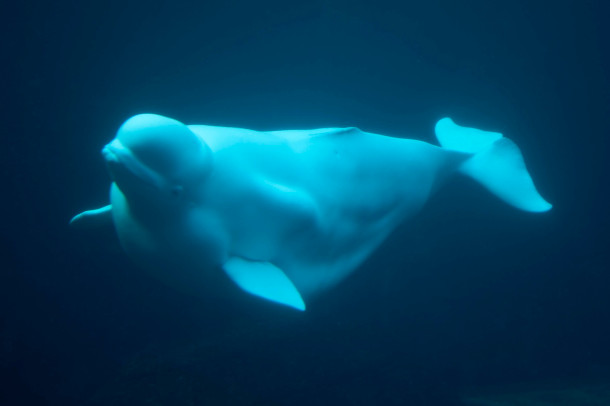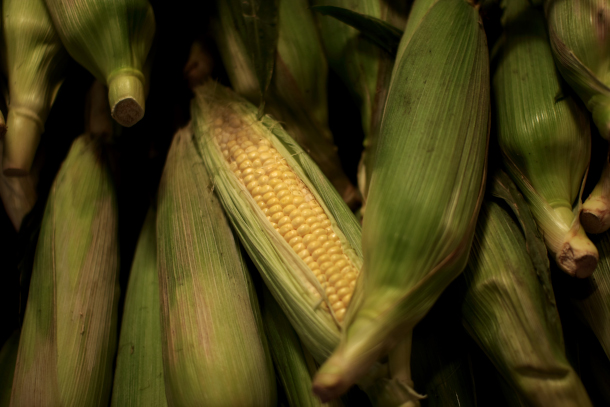Beyond the Headlines
Air Date: Week of November 20, 2020

A new Canadian study finds that marine mammals like beluga whales may be particularly at risk of coronavirus from humans. (Photo: Jason Pier, Flickr, CC BY-NC 2.0)
In this week’s Beyond the Headlines, Environmental Health News Editor Peter Dykstra joins Host Steve Curwood to discuss how coronavirus may be transmittable from humans to marine mammals through untreated wastewater. They go on to talk about how atrazine, one of the most widely used herbicides, may be harming endangered species and disrupting ecosystems, as well as affecting human health. And they wish a very happy birthday to Ted Turner, founder of CNN and longtime environmental champion.
Transcript
CURWOOD: Well, let's take a look beyond the headlines now with our usual guide. That's Peter Dykstra. He's an editor with Environmental Health News. That's ehn.org and dailyclimate.org. He's on the line now from Atlanta, Georgia. Hey there, Peter, how you doing? What's going on?
DYKSTRA: Well, hi, Steve. We've heard a lot justifiably about the tragedies of COVID-19. A quarter of a million human beings killed in this country by the pandemic with warnings that the worst could be yet to come. Here's one more little thing that you probably haven't heard. COVID could be a risk if transferred from human beings to marine mammals.
CURWOOD: Hmm. So how would that happen?
DYKSTRA: It would happen through sewage untreated sewage, which is still the rule and in so many parts of the world. It could contain the virus, it can live up to 25 days and offers some pathways to be transferred in the water to animals like beluga whales, sea otters, other whale species, dolphin species, seals and more.
CURWOOD: And of course, the marine mammals are in so much trouble already. What else do you have this week?
DYKSTRA: There's a common herbicide, actually the second most common used in this country. Atrazine is used on all sorts of things from golf courses to Christmas tree farms, to dozens and dozens of different crops, notably corn, and local produce like tomatoes. And we are told by the EPA, which just renewed Atrazine to be used for another 15 years, that in spite of that fact, Atrazine could cause harm to as many as 1000 already threatened and endangered plant and animal species.
CURWOOD: Well, I'm scratching my head on this one, Peter, because Atrazine has been linked to everything from breast cancer, prostate cancer, birth defects, neurological problems in people and such. It's pretty bad for humans, and yet it's been approved for another 15 years.
DYKSTRA: Welcome to the Donald Trump era EPA where industrial interests come ahead of environmental protection, even in the Environmental Protection Agency.
CURWOOD: Of course, Atrazine is horrible for wildlife as well.

The herbicide Atrazine is mostly commonly used on corn crops. (Photo: Naoya Fujii, Flickr, CC BY-NC 2.0)
DYKSTRA: There's some evidence that Atrazine has been responsible for chemically castrating some frog species. There are so many other species that could be at risk, not just from direct application of Atrazine to food, but spray drift from Atrazine sites to places nearby. And of course, water pollution. Atrazine is a major factor in pollution of the entire Mississippi river system. There are so many different ways that this ubiquitous chemical is potentially harming our lives and the environment around us.
CURWOOD: Okay, Peter, I'm ready for some better news. Maybe if we look back in history, we'll find something to cheer us up.
DYKSTRA: How about a birthday party that's near and dear to my heart. My old boss, Ted Turner, turns 82 years old. He was born in Cincinnati, Ohio, not in the south, on November 19th 1938. Ted, of course, founded CNN and is responsible for so many things in which he was way ahead of his time.
CURWOOD: And what? He's not only the father of CNN, but also Captain Planet, he would come to the society of environmental journalists meetings. I liked that.
DYKSTRA: He took all sorts of journalism very seriously. But he gave a big boost to covering the environment. Ted was a man way ahead of his time on climate change, on habitat, on endangered species, and on all manner of environmental issues.
CURWOOD: So let's have the Ted Turner party. Hmm?
DYKSTRA: Absolutely.
CURWOOD: Thanks! Peter Dykstra is an editor with Environmental Health News, that's ehn.org and dailyclimate.org. We'll talk to you again real soon!
DYKSTRA: All right, Steve, thanks a lot. Talk to you soon. Happy birthday, Ted!
CURWOOD: And Happy Thanksgiving to everybody. And there's more in these stories on the living on earth website which is loe.org
Links
More on how the coronavirus may be transmitted from humans to marine mammals
Living on Earth wants to hear from you!
Living on Earth
62 Calef Highway, Suite 212
Lee, NH 03861
Telephone: 617-287-4121
E-mail: comments@loe.org
Newsletter [Click here]
Donate to Living on Earth!
Living on Earth is an independent media program and relies entirely on contributions from listeners and institutions supporting public service. Please donate now to preserve an independent environmental voice.
NewsletterLiving on Earth offers a weekly delivery of the show's rundown to your mailbox. Sign up for our newsletter today!
 Sailors For The Sea: Be the change you want to sea.
Sailors For The Sea: Be the change you want to sea.
 The Grantham Foundation for the Protection of the Environment: Committed to protecting and improving the health of the global environment.
The Grantham Foundation for the Protection of the Environment: Committed to protecting and improving the health of the global environment.
 Contribute to Living on Earth and receive, as our gift to you, an archival print of one of Mark Seth Lender's extraordinary wildlife photographs. Follow the link to see Mark's current collection of photographs.
Contribute to Living on Earth and receive, as our gift to you, an archival print of one of Mark Seth Lender's extraordinary wildlife photographs. Follow the link to see Mark's current collection of photographs.
 Buy a signed copy of Mark Seth Lender's book Smeagull the Seagull & support Living on Earth
Buy a signed copy of Mark Seth Lender's book Smeagull the Seagull & support Living on Earth

